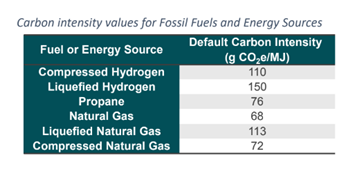 Source: Environment and Climate Change Canada, 2022
Source: Environment and Climate Change Canada, 2022 The CPA encourages members to apply for credits under the final Clean Fuel Regulations, published this summer, to maximize the opportunity for propane.
The final regulations, under the Canadian Environmental Protection Act, 1999, were registered on June 20, 2022, bringing a Canadian Clean Fuel Standard (CFS) into force. The final regulation applies only to petroleum-based fuels used in transportation. The regulation does not apply to gaseous fuels sold in Canada (propane, natural gas and hydrogen); international maritime fuels; remote, stationary power and home heating oils.
Credit Generation
The CFS sets out the following lifecycle carbon intensity (CI) limits for each fuel type for credit generation opportunities:
 Source: Environment and Climate Change Canada, 2022
Source: Environment and Climate Change Canada, 2022
Note that the government’s CI value for propane is higher than the 72 IHS Markit calculated in its 2022 study for the CPA. The CPA will continue to work with the government on lowering the CI and encourages members to reference the study in their respective advocacy.
The opportunity is now to generate credits
Under the CFS, propane would generate credits (i.e., 10% below the default baseline value) until 2028. At that point, the CI of propane of 74 gCO2e/MJ is on par with the default value, per the graph below. 
Source: Environment and Climate Change Canada, 2022
‘Registered creators’ can also generate compliance credits by reducing the CI of gaseous fuels (as opposed to liquid fuels). This includes projects that reduce the lifecycle emissions of gaseous fuels and promote low-CI gaseous fuels (e.g., renewable natural gas, biogas, hydrogen and renewable propane). However, a primary supplier cannot satisfy more than 10% of their reduction requirement with compliance credits derived from gaseous fuel CI reduction. The current default CI value for propane only receives credit generation status until 2028; after that the value is higher than the default CI.
The CPA continues to work with the relevant ministries in the federal government to recognize the low-emission profile of propane and the industry’s focus on reducing its emissions intensity.